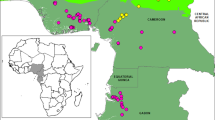Abstract
Soil microbial diversity consisted of both culturable and non-culturable microbes. The cultivated microbes can be identified by conventional microbiological processes. However, that is not possible for the non-culturable ones. In those cases, next-generation sequencing (NGS)-based metagenomics become useful. In this study, we targeted two very popular tea gardens of Darjeeling hills—Makaibari (Mak) and Castleton (Cas). The main difference between these two study areas is the type of manure they use. Mak is solely an organic tea garden using all organic manure and fertilizers whereas Cas uses inorganic pesticides and fertilizers. The main aim was to compare the effect of organic manure over chemical fertilizers on the soil microbiomes. We have performed the 16 s metagenomics analysis based on the V3–V4 region. Downstream bioinformatics analysis including reverse ecology was performed. We found that the overall microbial diversity is higher in Mak compared to Cas. Moreover, the use of organic manure has reduced the population of pathogenic bacteria in Mak soil when compared to Cas soil. From the observations made through the metagenomics analysis of Mak and Cas soil samples, we may conclude that the application of organic manure supports the population of good bacteria in the soil which may eventually impact the tea garden workers’ health.





Similar content being viewed by others
References
Ahmmed F, Hossain MI (2016) A study report on working conditions of tea plantation workers in Bangladesh. International Labour Organization.
Bae E-A, Han MJ, Song M-J, Kim D-H (2002) Purification of Rotavirus Infection-Inhibitory Protein from Bifidobacterium Breve K-110. COREE, REPUBLIQUE DE, Korean Society for Applied Microbiology, Seoul
Baruah TC, Barthakur HP (1997) A text book of soil analysis. Vikas Publishing House Pvt Ltd., New Delhi
Bottone EJ (2010) Bacillus cereus, a volatile human pathogen. Clin Microbiol Rev 23(2):382–398. https://doi.org/10.1128/CMR.00073-09
Bray RH, Kurtz LT (1945) Determination of total, organic, and available forms of phosphorus in soils. Soil Sci 59(1):39–46
Cao Y, Wang Y, Zheng X, Li F, Bo X (2016) RevEcoR: an R package for the reverse ecology analysis of microbiomes. BMC Bioinform 17(1):1–6. https://doi.org/10.1186/s12859-016-1088-4
Chapman HD, Pratt PF (1962) Methods of analysis for soils, plants and waters. Soil Sci 93(1):68
Chenoll E, Rivero M, Codoñer FM, Martinez-Blanch JF, Ramón D, Genovés S et al (2015) Complete genome sequence of Bifidobacterium longum subsp. infantis Strain CECT 7210, a probiotic strain active against rotavirus infections. Genome Announc 3:e00105-e115. https://doi.org/10.1128/genomea.00105-15
Daniel R (2005) The metagenomics of soil. Nat Rev Microbiol 3(6):470–478. https://doi.org/10.1038/nrmicro1160
Frost JA (2001) Current epidemiological issues in human campylobacteriosis. J Appl Microbiol 90:85S-95S. https://doi.org/10.1046/j.1365-2672.2001.01357.x
Gayathri MP, Arjunan R (2019) Health afflictions of tea plantation workers in Coonoor. Nilgiris Int J Health Sci Res 9(11):85–90
Inglis TJ, Sagripanti JL (2006) Environmental factors that affect the survival and persistence of Burkholderia pseudomallei. Appl Environ Microbiol 72(11):6865–6875. https://doi.org/10.1128/AEM.01036-06
Jackson ML (1973) Soil chemical analysis. Prentice Hall of India Private Limited, New Delhi, p 498
Kakirde KS, Parsley LC, Liles MR (2010) Size does matter: application-driven approaches for soil metagenomics. Soil Biol Biochem 42(11):1911–1923. https://doi.org/10.1016/j.soilbio.2010.07.021
Li F, Chen L, Zhang J, Yin J, Huang S (2017) Bacterial community structure after long-term organic and inorganic fertilization reveals important associations between soil nutrients and specific taxa involved in nutrient transformations. Front Microbiol 8:187. https://doi.org/10.3389/fmicb.2017.00187
Nesme J, Achouak W, Agathos SN, Bailey M, Baldrian P, Brunel D, Frostegård Å, Heulin T, Jansson JK, Jurkevitch E, Kruus KL (2016) Back to the future of soil metagenomics. Front Microbiol 7:73. https://doi.org/10.3389/fmicb.2016.00073
Picard C, Fioramonti J, Francois A, Robinson T, Neant F, Matuchansky C (2005) Review article: bifidobacteria as probiotic agents—physiological effects and clinical benefits. Aliment Pharmacol Ther 22:495–512. https://doi.org/10.1111/j.1365-2036.2005.02615.x
Rajbangshi PR, Nambiar D (2020) “Who will stand up for us?” the social determinants of health of women tea plantation workers in India. Int J Equity Health 19(1):1–10. https://doi.org/10.1186/s12939-020-1147-3
Rajput P, Sinha RK, Devi P (2021) Current scenario of pesticide contamination in water. In: Ahamad A, Siddiqui SI, Singh P (eds) Contamination of water. Academic Press, pp 109–119. https://doi.org/10.1016/B978-0-12-824058-8.00032-3
Rodríguez-Eugenio N, McLaughlin M, Pennock D (2018) Soil pollution: a hidden reality. FAO, Rome
Roy Chowdhury D, Paul M, Banerjee SK (2014) Review on the effects of biofertilizers and biopesticides on rice and tea cultivation and productivity. Int J Sci Eng Technol 2:96–108
Shapiro BJ, Polz MF (2015) Microbial speciation. Cold Spring Harb Perspect Biol 7(10):a018143. https://doi.org/10.1101/cshperspect.a018143
Walkey A, Black CA (1974) Critical examination of rapid method of determining organic carbon in soil. Soil Sc 1974(63):251
Acknowledgements
We acknowledge Makaibari and Castleton tea gardens for providing us samples and other supports. Especial acknowledgement to Dr. P.K. Dutta, North Bengal Medica Nursing Home, Siliguri for sharing his knowledge about the health aspect of tea garden workers.
Author information
Authors and Affiliations
Contributions
AS conceived the idea and did the experimental design. PK, GS, SC, MB collected and prepared samples for metagenomics. MB, PK and SB did the soil analysis related work. AS, GS and IS did the bioinformatics analysis. Figures and art works are mostly done by IS. All the authors contributed in manuscript writing and approved.
Corresponding author
Ethics declarations
Conflict of interest
The authors declare that the research paper was written in the absence of any commercial or financial relationships that could be construed as real or potential conflict of interest.
Research involving human and animal participants
No animal or human were treated as sample in this study.
Additional information
Communicated by Erko Stackebrandt.
Publisher's Note
Springer Nature remains neutral with regard to jurisdictional claims in published maps and institutional affiliations.
Supplementary Information
Below is the link to the electronic supplementary material.

Rights and permissions
About this article
Cite this article
Sarkar, I., Kar, P., Sen, G. et al. Metagenomic outlooks of microbial dynamics influenced by organic manure in tea garden soils of North Bengal, India. Arch Microbiol 204, 33 (2022). https://doi.org/10.1007/s00203-021-02635-6
Received:
Revised:
Accepted:
Published:
DOI: https://doi.org/10.1007/s00203-021-02635-6




